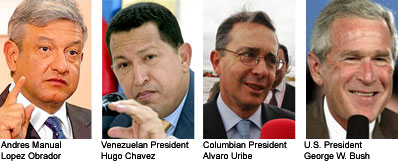JIM.LOBE

WASHINGTON (IPS/GIN) – For those who believed that the precise and overwhelming demonstration of U.S. military power in Afghanistan and Iraq would “shock and awe” the rest of the world–and particularly Washington’s foes and aspiring rivals–into accepting its benevolent influence, 2006 was not a good year.
Not only has Washington become ever more bogged down–at the current rate of nearly $3 billion and 20 soldiers’ lives a week–in an increasingly fragmented and violent Iraq, whose de facto civil war threatens to draw in its neighbors, but a resurgent Taliban has exposed the fragility of what gains have been made in Afghanistan since the U.S.-led military campaign ousted the group five years ago.
The looming succession battle in Turkmenistan, whose natural gas endowments and strategic perch next to both Iran and Afghanistan, make it a very desirable piece of real estate and will likely intensify this latest version of “Great Game.”
By collaborating with China in both the UN Security Council and the Shanghai Cooperation Organization (SCO), Moscow has also challenged the unipolarists’ notion that Washington’s overwhelming global military dominance would not provoke the creation of countervailing coalitions designed to contain its power.
Even in Africa, defying the U.S. came at little cost. The Sudan, accused by Bush himself of two years of genocide in Darfur, maneuvered Washington into backing a clearly unworkable peace accord and then, when it fell apart, not only rejected repeated U.S. demands to permit deployment of a UN peacekeeping force to the region, but also helped spread the conflict into neighboring Chad and the Central African Republic.
In Latin America, Washington’s fears were averted, with the victory of left-wing presidential candidate Andres Manuel Lopez Obrador in Mexican elections last summer. Nonetheless, clumsy U.S. efforts to influence elections over the past year in Bolivia and Nicaragua proved counter-productive, as candidates backed by Venezuelan President Hugo Chavez, who appears to delight in nothing more than provoking Bush, won in both countries, as well as in Ecuador.
Coupled with Chavez’ own sweeping victory earlier this month, the year’s election results in Latin America appear to have confirmed a left-wing populist and anti-U.S. trend–the so-called “pink tide”–which, along with the recent disclosures regarding ties between right-wing paramilitaries and the government of Colombian President Alvaro Uribe, poses serious threats to Washington’s multi-billion-dollar anti-drug effort in the Andes.
While the war hawks predictably claimed that the results reflected more on the public’s lack of confidence in the way Bush had carried out policy than on the policy itself, a battery of polls, in both the run-up to the election and immediately afterward found that a large majority of citizens believe the administration’s belligerent unilateralism had made the United States–as well as the rest of the world–less, rather than more, safe.
Nearly eight in 10 respondents in one survey sponsored by the influential Council on Foreign Relations and designed by legendary pollster Daniel Yankelovich, said they thought the world saw the U.S. as “arrogant,” and nearly 90 percent said such negative perceptions threaten national security.












